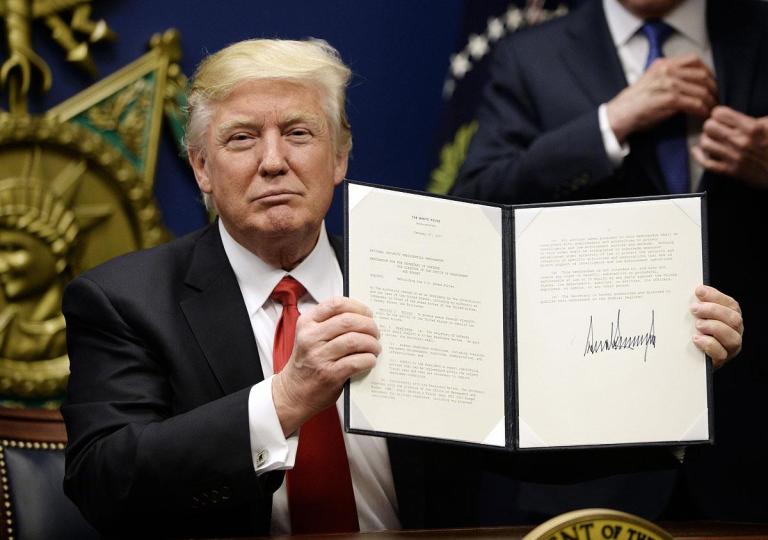 Last week, U.S. President Donald Trump signed an executive order banning citizens of seven, predominantly Muslim, nations in the Middle East from entering the U.S. for the next 120 days until the U.S. has developed a more stringent vetting process regarding Muslims. Of course, Trump’s purpose for this seemingly un-American measure is to stop radical, militant Muslims from entering the U.S. for the purpose of trying to harm its citizens as part of some jihad.
Last week, U.S. President Donald Trump signed an executive order banning citizens of seven, predominantly Muslim, nations in the Middle East from entering the U.S. for the next 120 days until the U.S. has developed a more stringent vetting process regarding Muslims. Of course, Trump’s purpose for this seemingly un-American measure is to stop radical, militant Muslims from entering the U.S. for the purpose of trying to harm its citizens as part of some jihad.
Only days later, many Americans are voicing their opposition and even anger toward President Trump for this action. Some states are banding together, starting with Washington state, in suing President Trump for this executive order, claiming it is unconstitutional. And some of the largest U.S. corporations are expressing their opposition as well, if not doing more than that. Yet President Trump in signing this executive order is merely carrying out what he said many times during his political campaign for the presidency that he would do if elected president–make America safe by imposing some type of stronger vetting process on Muslims seeking to enter the U.S.
Folks, the U.S. and even the entire world needs to have a very public and thorough conversation about certain texts in the Qur’an. This may happen soon in our courts. Many people do not realize the importance of a supposed holy text when a religion is based on it. There are probably no other religions in the world that are based more on a religious text than the two largest religions in the world, both of which are supposedly monotheistic–Christianity and Islam, although one might include the small religion of Judaism.
The world’s population is 7.2 billion people. One third of the world’s population is professedly Christian, which is 2.3 billion people, and Christianity is based on the Bible. Nearly one fifth of the world’s population is professedly Muslim, which is 1.5 billion people, and Islam is based on the Qur’an. That is a lot of the world’s people, which is well over half.
Muslims have a strong tradition of memorizing their holy text, the Qur’an. But some of these militant, radical Muslim groups, such as Al Qaeda and ISIS, emphasize even more that its members memorize the Qur’an. I have blogged about this and cited sources, including the U.S. military.
The troubling thing about the Qur’an is that it has many violent texts that are abhorring to most peace-loving and religiously tolerant people. I mean especially people who live in a democratic, pluralistic, ethnically-diverse nation such as the U.S. Our nation was founded so much by immigrants from far away. Many of them came here primarily to escape religious persecution in their native church-states in Europe. The New World of America became a beacon of hope for such people. And I think this heritage is the main thing that made the U.S. great. So, it seems ironic for President Trump to begin his presidency by barring Middle Easterners, mostly because most of them are Muslim.
It may be that most Muslims are peace-loving, religiously-tolerant people. I don’t know since most of them live in the Indonesia and the Middle East. Certainly there was a dark time when Catholic Europe, and even much of Protestant Europe, was very religiously intolerant by persecuting and even killing people who did not adhere to Catholicism or Protestantism. So, even though I am a Christian, I’m not saying that Christianity has a spotless history about such things. Far from it. Yet Jesus and the New Testament in the Bible do not promote violence against people of a different religious faith. In fact, Jesus is well known for teaching his disciples to love their enemies and turn the other cheek. America has been strongly influenced by Christians who lived by this moral precept of Jesus.
Yet Trump is only trying to keep America safe from the radical Muslims and others who want to harm Americans if not impose their religion forcibly on us and the world. There is a difference between personal vengeance and the state exercising its authority and power to govern wisely according to moral laws, with those who break them suffering the consequences, sometimes necessarily including bodily punishment.
Like many Americans right now, I question how President Trump has gone about issuing this executive order and how he chose those seven countries and not others, such as including Iraq but not Saudi Arabia.
The following is an excerpt from my first post on the subject of these violent texts in the Qur’an, written on April 4, 2014, entitled “Are We Doing Enough about Islamic Suicide Bombers?” I think we need to have a national conversation, if not a world conversation, about this. I don’t think our American founding fathers meant to protect religious people who advocate such violence. Here are the Qur’an texts with references in parentheses:
Along with many positive moral features of Islam, the Koran also sometimes advocates violence against “hypocrites,” “idolaters,” “unbelievers,” and “infidels.” The Koran labels apostate Muslims as “hypocrites,” and it repeatedly and specifically identifies Jews and Christians as either “unbelievers” or “infidels.” The following are some examples of hostilities advocated in the Koran:
- · “Many large armies have fought by the side of their prophet [Muhammed]…. We will put terror into the hearts of the unbelievers. They serve other deities besides God” (3:146, 150).
- · “Believers [Muslims], take neither the Jews nor the Christians for your friends. They are friends with one another. Whoever of you seeks their friendship shall become one of their number. God does not guide the wrongdoers” (5:51).
- · “You will find that the most implacable of men in their enmity to the faithful [Muslims] are the Jews and the pagans, and that the nearest in affection to them are those who say: ‘We are Christians’” (5:82).
- · “the hypocrites,… If they desert you, seize them and put them to death wherever you find them” (4:88-89).
- · “slay the idolaters wherever you find them” (9:5).
- · “Fight against such of those to whom the Scriptures were given as believe in neither God nor the Last Days, who … do not embrace the true Faith” (9:29).
- · “the faithful … They will fight for the cause of God, they will slay and be slain. Such is the true promise which He has made them in the Torah, the Gospel and the Koran” (9:111).
- · “Believers, make war on the infidels who dwell around you” (9:123).
- · “When you meet the unbelievers in the battlefield strike off their heads” (47:4).
Some Muslims argue that some of these texts are not to be taken literally or that they must be understood in the time in which they were written, when Muhammed supposedly was fighting a battle. I’m not convinced, and the radical, jihadist Muslim fighters of Al Qaeda and ISIS aren’t either. See the following similar posts:
“Is Islam a Peaceful Religion”
“Did El-Sisi Say Revise the Qur’an?”
“El-Sisi Is Not the Only Muslim Questioning the Qur’an”
“Memorizing the Entire Qur’an”
“Does the Qur’an Promote Violence?”













